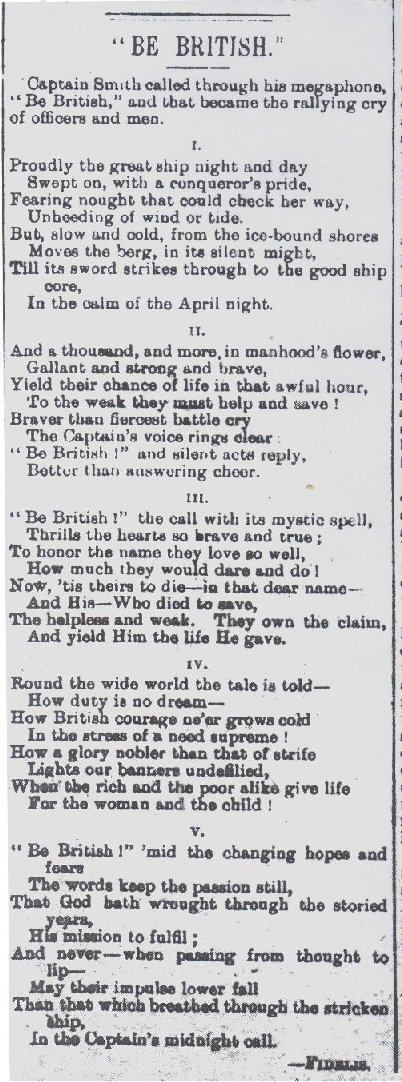Main menu:
Sligo Poets 1912-1923
Be British
Sligo Newspapers > Sligo Independent

The Titanic disaster occured on 15 April 1912 and was widely reported in the local newspapers. This poem relates to a story, possibly apocrophal, that from the bridge, Captain Smith called through his megaphone, "Be British," and that became the rallying cry of the officers and crew. These are also sometimes referred to as Captain Smith's last words and are included on the plaque on his memorial in Lichfield.
There is no clue as to the origin or author of this poem. It is not mentioned in lists and websites devoted to the vast quantity of "Titanic poetry" so it may have been written by a local unionist, from Sligo or one of the adjacent parts of Ulster.
Though there is an absence of any reference to the current Home Rule debate and the Unionist opposition the call to "Be British" had resonances for Ireland at that time.
It appears that there were seven Sligo people on the Titanic and that only one survived. See Sligo Champion report November 2012. The local newspapers at the time found it difficult to get exact details. The Sligo Times said there were four Sligo people on board and named Alfred Middleton, an electrician on the ship, as one of the dead.
The others lost were Mary Delia Burns, Kilmacowen; Catherine 'Kate' Hargadon, Carraroe; Henry Hart, Ballisodare; Janie Carr, Castlerock, Aclare and John Meehan, Carrowhuane, Curry, all third class pasengers. The survivor is named as Margaret Devaney from Kilmacoen who was travelling with Mary Delia Burns and Kate Hargadon.
The full list of victims is available here.
Sligo Independent 28 September 1912
xxxxxxxxxx“BE BRITISH.”
Captain Smith called through his megaphone, “Be British,”
and that became the rallying cry of officers and men.
xxxxxxxxxxI.
Proudly the great ship night and day
xxxxxSwept on, with a conqueror’s pride,
Fearing nought that could check her way,
xxxxxUnheeding of wind or tide.
But, slow and cold, from the ice-bound shores
xxxxxMoves the berg, in its silent might,
Till its sword strikes through to the good ship core,
xxxxxIn the calm of the April night.
xxxxxxxxxxII.
And a thousand, and more, in manhood’s flower,
xxxxxGallant and strong and brave,
Yield their chances of life in that awful hour,
xxxxxTo the weak they must help and save!
Braver than fiercest battle cry
xxxxxThe Captain’s voice rings clear:
“Be British!” and silent acts reply,
xxxxxBetter than answering cheer.
xxxxxxxxxxIII.
“Be British!” the call with its mystic spell,
xxxxxThrills the hearts so brave and true;
To honour the name they love so well,
xxxxxHow much would they dare and do!
Now, ’tis theirs to die–in that dear name–
xxxxxAnd His–Who died to save,
The helpless and weak. They own the claim,
xxxxxAnd yield Him the life He gave.
xxxxxxxxxxIV.
Round the wide world the tale is told–
xxxxxHow duty is no dream–
How British courage ne’er grows cold
xxxxxIn the stress of a need supreme!
How a glory nobler than that of strife
xxxxxLights our banners undefiled,
When the rich and the poor alike give life
xxxxxFor the woman and the child!
xxxxxxxxxxV.
“Be British!” ’mid the changing hopes and fears
xxxxxThe words keep their passion still,
That God hath wrought through the storied years,
xxxxxHis mission to fulfil;
And never–when passing from thought to lip–
xxxxxMay their impulse lower fall
Than that which breathed through their stricken ship,
xxxxxIn the Captain’s midnight call.
xxxxxxxxxxxxxxxxxxxxxxxxxxxxxx–Fidelis.
